Biden, Starmer to tackle Iran threats in first White House meeting
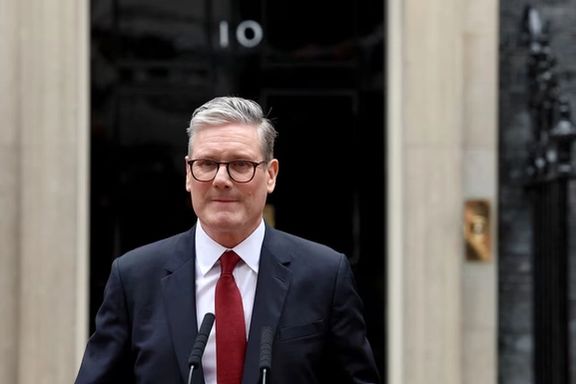
US President Joe Biden will host Britain's new Prime Minister, Keir Starmer, at the White House on Wednesday, focusing on countering Iran's escalating global threats.

US President Joe Biden will host Britain's new Prime Minister, Keir Starmer, at the White House on Wednesday, focusing on countering Iran's escalating global threats.
Key issues on the agenda include the conflicts in Ukraine and the Israel-Gaza war, with a critical focus on Iran's nuclear ambitions and destabilizing activities. Tehran's clandestine actions and refusal to fully cooperate with the International Atomic Energy Agency (IAEA) have fueled suspicions of its intent to develop nuclear weapons, potentially sparking a regional arms race.
Additionally, Iran's Houthi rebels in Yemen continues to attack commercial shipping in the Red Sea region and Saudi Arabian oil infrastructure, threatening global energy supplies and trade routes.
With the victory of Labor party in the UK, its politicians have called for tough action against the Islamic Revolutionary Guard Corps (IRGC), including its proscription. The cross-party interest in Iran over the past two years across both Houses of Parliament has been unprecedented.
Recently, over 500 MPs and Lords urged the government to proscribe the IRGC. The Labor manifesto highlights "assassination plots by the IRGC" as part of rising threats in the UK from hostile states, pledging to adapt counter-terrorism measures for state-based threats.
This includes assassination and kidnap attempts on Iran International staff, with the UK's intelligence agency, MI5, calling Iran one of the country's biggest foreign threats on its soil.
Both the new Home Secretary and Foreign Secretary previously urged amendments to the UK’s Terrorism Act 2000 to cover hostile state actors offering hope of proscription under the new government.
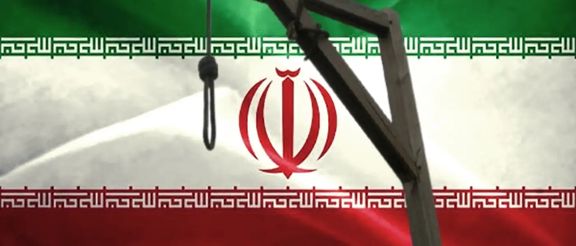
Political prisoners across nine Iranian prisons have joined the "No to Execution Tuesdays" campaign, condemning the death sentence of labor activist Sharifeh Mohammadi as "shameless and disgraceful."
The movement calls for nationwide support to halt the "execution machine" of the Islamic Republic. On Tuesday, the prisoners will further their protest with a hunger strike against executions. Hundreds of prisoners have been executed this year.
A United Front Against Repression
The protesting prisoners, confined in Evin, Ghezel Hesar, Karaj Central, Khorramabad, Khoy, Naqadeh, Saqqez, Mashhad, and Tabriz prisons, issued a statement on Monday, marking the twenty-fourth week of their Tuesday hunger strikes. They warned of increasing executions in the coming weeks and months, following the recent presidential election.
"The repressive apparatus of the Islamic Republic," the statement reads, "reduced executions to the maximum extent possible before the electoral show. However, it will now accelerate the issuance and execution of death sentences and will suppress the families of the victims more than before."
Escalating Human Rights Violations
The cases of Sharifeh Mohammadi and the arrest of Rana Kourkour, the sister of condemned protester Mojahed Kourkour, exemplify the government's tactics. These incidents signify an escalation in human rights violations, as authorities continue to disregard the right to life with impunity.
The hunger strike campaign began on January 29 and 30 in response to the executions of Vafa Azarbar, Mohammad Faramarzi, Pejman Fatehi, and Mohsen Mazloum. Initially spearheaded by inmates in Ghezel Hesar Karaj prison, the movement quickly spread, with prisoners from other facilities joining the cause. Over the past year, Ghezel Hesar jail has become the largest center for executions in the country.
A Defiant Stand
The striking prisoners noted the rejection of the recent elections by the majority of Iranian voters. They emphasized, "Reviewing the behavior of the government's repressive apparatus in recent years has shown that whenever there has been a grand display of the majority of the Iranian people against the ruling minority, the government's repressive machine has become more active. To instill fear and intimidate the people to prevent uprisings and political and social protests against tyranny, it has made the most use of executions."
This stance underscores the prisoners' belief that the fight against executions will only be successful through "solidarity, collective and widespread activism." They argue that no one can fully comprehend the depth of the pain and suffering of those at risk of execution as well as the prisoners themselves. They have called on prisoners nationwide to join the "campaign against executions."
Alarming Statistics and Global Attention
On July 3, the Iran Human Rights Organization reported 249 executions in the previous six months, highlighting a surge in the use of the death penalty. The increase is particularly alarming in the wake of the presidential election, as noted by Mahmood Amiry-Moghaddam, the director of the organization. He urged both the international community and the Iranian public to prepare for a potential wave of executions and to respond appropriately.
Amnesty International's annual report on the death penalty, released on May 29, highlighted Iran's rise in executions, revealing that nearly 75% of all recorded executions worldwide last year took place in Iran. According to Amnesty, the Iranian government has intensified its use of the death penalty following the Mahsa movement, aiming to "instill fear among the people and tighten its grip on power."
A Call for Action
The "No to Execution Tuesdays" campaign is not just a protest but a call for justice and human rights. It serves as a reminder of the reality faced by those who speak out against tyranny. As the prisoners continue their hunger strike, their plea for solidarity and activism resonates beyond prison walls, calling for global attention and action to end the cycle of repression and execution in Iran.
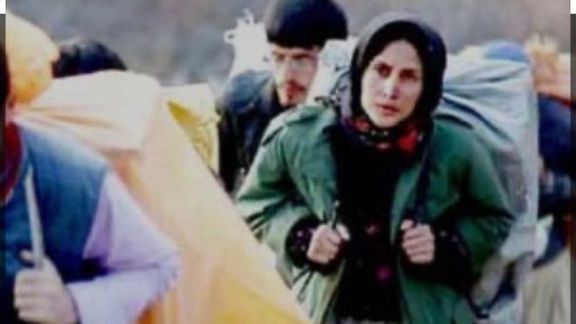
Human rights organizations have documented an increase in deadly shootings by Iran’s security forces targeting Kurdish border couriers transporting goods into Iraq, who are trying to make money to survive.
In 2023, Iran shot at 507 Kurdish people carrying goods from Iraq, and 44 of them were killed, according to human rights organization United for Iran, and since the start of this year 111 Kurds have been shot at the border for that same reason.
The Kurdish border couriers, known in Kurdish and Farsi as Kolbars, have limited access to justice, said Mahmood Amiry-Moghaddam, the director of Norway-based Iran Human rights.
"When the guards see them, they shoot at them. We hear about people who have been killed, but there are also people who have lost their limbs. They get paralyzed because of spinal cord injury,” said Amiry-Moghaddam.
Many of them are boys as young as 13, but others are highly educated men and women, and some as old as 77 years of age, who rely on carrying a heavy load of goods through dangerous, mountainous terrain as a means of survival, said Shaghayegh Norouzi from United for Iran.
“You can find doctors that they are just finished their education and they came back from Tehran and they cannot work in Kurdistan,” Norouzi told Iran International.
The Kolbars typically bypass customs to earn payment based on weight and the type of good they are transporting. They often carry loads between 55 and 110 pounds through mountainous terrain for upwards of 10 kilometres, according to reports.
Items are up for resale once it makes its way through border with goods ranging from tea, electronics, textiles, beauty products, and cigarettes. Alcohol is usually avoided as it involves harsher punishment.
Ethnic pressures
Taimoor Aliassi, the Executive Director and UN Representative of the Kurdistan Human Rights-Geneva (KMMK-G) called the shootings “extrajudicial executions” that reflect a “systemic” targeting of one Iran’s most marginalized ethnic groups.
“People have a right to food, right to work, a right to health, right to life,” said Aliassi.
He told Iran International the shootings of Kolbars has been happening for two decades and poverty is the main force driving them to this work.
According to official figures around 20 million landmines have been planted in the Kurdish region of Iran since the war with Iraq in the 1980s, which has made the land unsuitable for farming and created lethal conditions to walk through, said Aliassi.
"We have a lot of people living in the area who cannot work on their land. And then, there's no invest investment, and development projects in the region” he added.
Human Rights Watch (HRW) published a report on the increase in Iran’s security forces shooting Kolbars. HRW interviewed 13 Kurdish border couriers between October 2021 and April 2024, who survived and or witnessed the shootings.
Witnesses told HRW that Iran’s FARAJA Border Guard force and the Islamic Revolutionary Guard Corps (IRGC) carried out the attacks on border couriers.
According to the Monday’s report, six people told the human rights group that Iranian security forces aimed at them and shot them, and that they had seen others shot. Two others told them that Iranian security forces shot and killed their relatives who worked as border couriers. One lost a leg after stepping on a landmine.
HRW reviewed medical records and court documents.
A security issue
HRW said in its repot that Iran’s deceased president who died May 19 in a helicopter crash, Ebrahim Raisi, suggested to Kurdish communities to consider regulating Kurdish border couriers work, yet officials in Iran often deem it a security issue.
Kurdish political prisoner, Mohiyedin Ebrahimi was a Kolbar who was executed in Iran on March 17 2023 on security charges. He was arrested in 2017 after being caught carrying alcohol through the border.
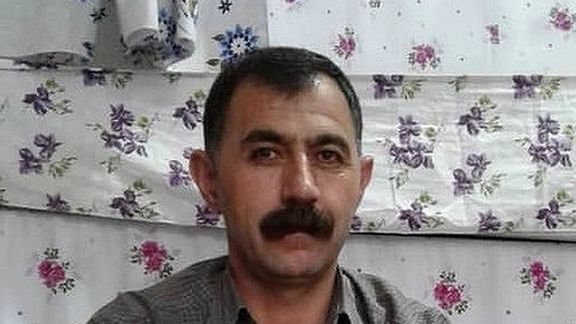
"I support twelve people in my family in Oshnavieh and have been working as a kolbar (human mules who carry goods across border) for several years,” he wrote in a letter published on Iran Human Rights website.
“On 17 November 2017, I was crossing the border from the Kurdistan region in Iraq with two horses and four carts in the dark of the night. Several other people were walking a few hundred meters ahead of me when border forces started shooting at them and they started running. The border forces shot at me as well and hit me on the leg, causing great injury. Two horses and four cartons of alcoholic beer were discovered and confiscated from me and I had to be transferred to the hospital,” he wrote in the letter.
He was officially sentenced to death on charges of baghy (armed rebellion) through membership of the Kurdistan Democratic Party of Iran.
Amiry-Moghaddam of Iran human rights cited another similar case.
On June 9, 2024, Edris Ali, also a Kurdish Kolbar was sentenced to death on “trumped up” charges of “espionage for Israel” said Amiry-Moghaddam based on confessions “extracted under torture.”
He said “his only crime was to smuggle alcoholic drinks as a Kolbar.”
For 10 dollars
Amiry-Moghaddam said Tehran is also targeting people carrying goods from Baluchistan, and that the targeting of ethnic minorities like Kurds and Baloch is a means of controlling and persecuting them.
“It’s indicative of a regime that doesn't value human lives and wants to create fear,” he said.
Aliassi of KMMK-G said in addition to gender and religious apartheid, Iran is also committing ethnic apartheid.
Aliassi said between 84 to 160 thousand people do work as a Kolbar on a daily basis, citing Iranian data.
"10 dollars" is what Kurdish border couriers get for transporting a heavy load through snow and cold weather, with the possibility of getting killed, injured or jailed, said Aliassi.
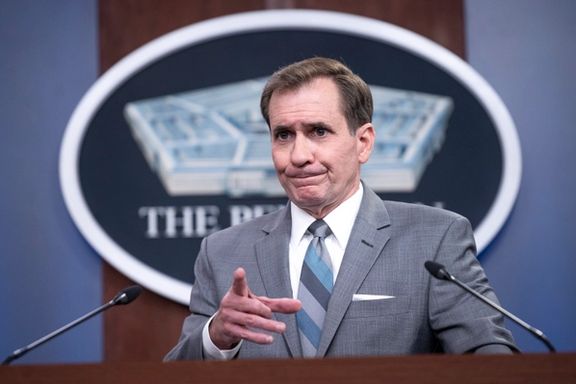
The Biden administration is not ready to resume nuclear talks with Iran under the new president, the White House national security council spokesman said Monday.
In his presidential campaign, Iran's president-elect Masoud Pezeshkian advocated engagement in constructive talks with Western powers to revive the 2015 nuclear deal (JCPOA) and to lift the sanctions that he says have crippled the Iranian economy since the withdrawal of the US from the agreement in 2018.
Asked whether Pezeshkian’s election will change the US negotiating position, the White House's John Kirby offered a blunt "no".
“They’re still supporting terrorist groups like Hamas and Hezbollah. They’re still supporting the Houthis as the Houthis attack ships in the Red Sea. They’re still attacking shipping as well. And they’re still supplying drones and drone technology and drone expertise to the Russians so that the Russians can continue to kill innocent Ukrainians like they did over the weekend,” Kirby told a press conference. “So no, no.”
He said Washington does not expect any change in Iran’s behavior after the election of Pezeshkian. “We’ll see what this guy wants to get done but we are not expecting any changes in Iranian behavior."
The US State Department earlier said that the Iranian elections will not have a major impact on the Biden administration's approach to Iran.
"The elections will not have a significant impact on our approach to Iran... Our concerns about Iran’s behavior are unchanged. At the same time, we remain committed to diplomacy when it advances American interests," a State Department spokesperson told Iran International.
While the Biden administration has tried to keep Pezeshkian at arm's length, the EU has welcomed his win, offering an olive branch to the Islamic Republic's new administration despite warnings by Iranian opposition figures and dissidents against any "appeasement" with Pezeshkian.
Nabila Massrali, the spokesperson for Foreign Affairs and Security Policy of the European Union, extended congratulations to Pezeshkian, saying the EU stands ready to engage with his administration.
"We are ready to engage with the new government in line with EU policy of critical engagement," Massrali tweeted on Saturday.
Several Iranian opposition figures have called on Western powers not to engage with the new government of Iran.
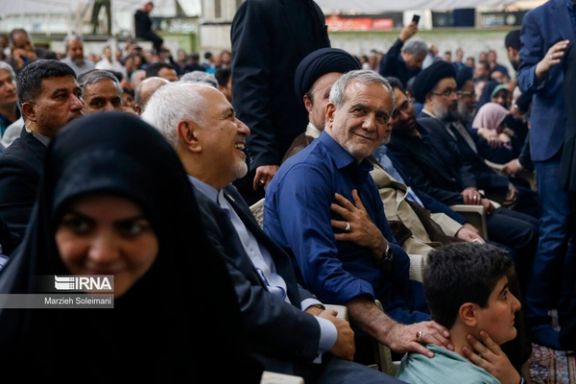
With Masoud Pezeshkian announced as the winner of Iran’s snap election, which followed the sudden death of President Ebrahim Raisi, uncertainties remain about when he will assume office and form the new government.
The inauguration of new presidents in the Islamic Republic typically occurs in early August, although no specific date is set. However, since there is currently no incumbent in office, there is some debate about when the new administration will officially begin.
The only timeframe that applies in case of the death of a president is 50 days until a new one should be elected. Raisi died in a helicopter crash on May 19, and the election was held on June 28 and the runoff on July 5.
There are several steps until the president-elect can be called Iran’s President.
After the election, the Guardian Council should confirm the validity of the results, ensuring that the election process followed legal precepts. Then, it issues a certificate of appointment for the president-elect. This document should be signed by the members of the Council and then sent to the Supreme Leader, who would announce the date for Tanfiz, when he officially endorses the election results and ratifies the new president. It is followed by Tahlif, or the swearing-in ceremony, which usually happens within a few days.
During the Tanfiz, Ali Khamenei hands over a decree, known as the "decree of confirmation" or "decree of validation", to the president-elect, formally recognizing him as the legitimate president. Without the Supreme Leader's approval, the president does not have the authority to assume office. During Tahlif, the newly elected president takes an oath before the Parliament (Majlis) in the presence of the head of the judiciary and the members of the Guardian Council, promising to uphold the constitution and faithfully execute his duties as the head of state. Both ceremonies are essential in the transition of presidential power, ensuring both legal and symbolic legitimacy for the incoming president.
Mojtaba Yousefi, a member of the parliament's presiding board, said this week the inauguration ceremony for Pezeshkian is scheduled for August 4 or 5. The president will then have 15 days to present his proposed ministers to the parliament for a vote of confidence, which is reportedly set to be held on September 5.
There is controversy about why the parliament, dominated by hardliners whose candidates lost to Pezeshkian, would not vote on the proposed cabinet sooner, given that fact that the country does not have a president and is run by interim Mohammad Mokhber, Raisi’s first vice president.
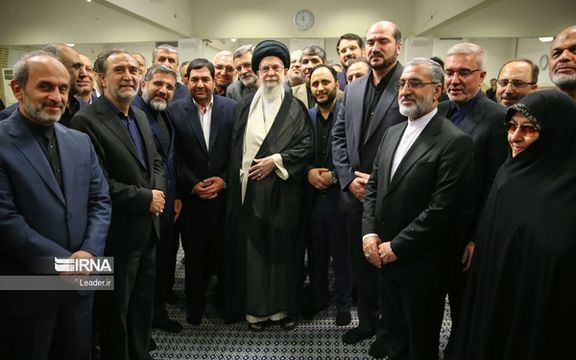
According to Abbas-Ali Kadkhodaei, the former spokesman of the Guardian Council, until the new government assumes office, members of the former cabinet can make decisions or appointments that could have financial implications for the next government.
This comes despite Mokhber’s directive in June that called on all executive bodies to “refrain from any changes to organizational structures, personnel reassignments, transfer of government property, implementation of new regulations, changes in tariffs and fees, and any actions outside the rules and regulations until the establishment of the fourteenth government.”
However, Kadkhodaei noted that unless there is a specific legal provision that states otherwise, the incumbent officials can make such decisions, implying that Mokhber’s directive may not be binding. “These are customary practices and have never been subject to legal debate,” he said.
Hossein Mirmohammad Sadeghi, a former lawmaker, said that there is no regulation for setting a date for the vote of confidence on the new cabinet, explaining that such dates are primarily based on considerations of different factors. These include the parliament's summer recess ending on July 21st and upcoming calendar events, like the observance of the Shiite mourning period, Ashura, on July 14th in Iran.
Hamid Aboutalebi, a former deputy chief of staff for political affairs of the office of Iran’s president under Hassan Rouhani, wrote a commentary on his X account on Monday, stressing the legal necessity of holding the endorsement ceremony as soon as possible. He said the president-elect should assume office by the 50th day after the death of the incumbent. He argued that according to the constitution, until the new government is formed, the parliament cannot impeach ministers or pass a vote of no confidence, leaving the body with no oversight capability in case of negligence or errors by the ministers.
Aboutalebi said this would present a serious constitutional challenge if the country would be without an incumbent president at the end of the 50-day period and would be governed by an unelected first vice president, with ministers who are not subject to parliamentary oversight.
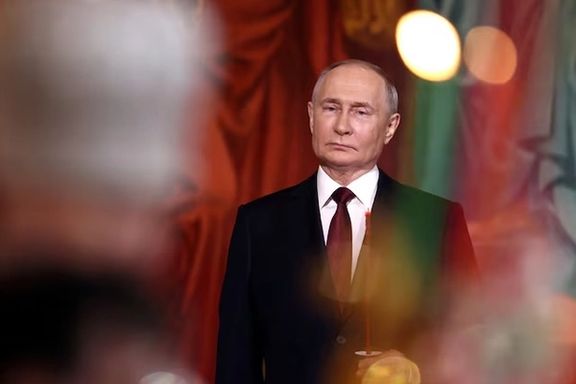
Russian President Vladimir Putin congratulated Masoud Pezeshkian on his election as the president-elect of Iran during a phone call on Monday.
According to ISNA, President Putin expressed his best wishes for Pezeshkian's success in his “significant responsibility ahead,” as well as “for the well-being and prosperity of the Iranian people.”
Pezeshkian was elected in a runoff on Friday, after a highly stage-managed electoral process following the death of President Ebrahim Raisi in a freak helicopter crash in May.
During the phone call, Putin noted that the relations between the Islamic Republic and Russia are at the highest level and expressed hope that these relations will continue during Pezeshkian's presidency.
Russia and Iran have strengthened their alliance in the past decade during the war in Syria where they both sent forces to rescue the government of Bashar al-Assad. Moscow has also sided with Tehran in its nuclear dispute with the West, condemning sanctions and continuing trade and financial relations. Iran in return has supplied Russia with hundreds of suicide drones that have been used against Ukrainian infrastructure and civilian targets.
Russia, which is also under Western sanctions, can offer Iran more military technology, but trade between the two allies has remained limited to less than $5 billion per year. In fact, both economies are heavily dependent on oil exports and they both compete for illicit shipments to China.
Putin also highlighted the expanding cooperation between Iran and Russia, particularly in the energy and transportation sectors. He invited Pezeshkian to attend the upcoming BRICS summit in Kazan and emphasized Russia's readiness to sign a comprehensive cooperation agreement between the two countries on the sidelines of the summit. The agreement is a new version of a previous accord signed in 2001.
According to ISNA, Pezeshkian expressed his gratitude for Putin's warm and friendly congratulations, stating, "We place great importance on our relations with the friendly and neighboring country of Russia, and we will undoubtedly strengthen these relations."
The president-elect emphasized the new government's commitment to pursuing and implementing the agreements made during the late President Raisi's administration.
Pezeshkian also highlighted the importance of cooperation between the two countries in international and regional organizations and alliances such as the Shanghai Cooperation Organization, BRICS, and Eurasia. He noted that the comprehensive cooperation agreement between Iran and Russia has been finalized and is ready to be signed on the sidelines of the BRICS summit in Russia.